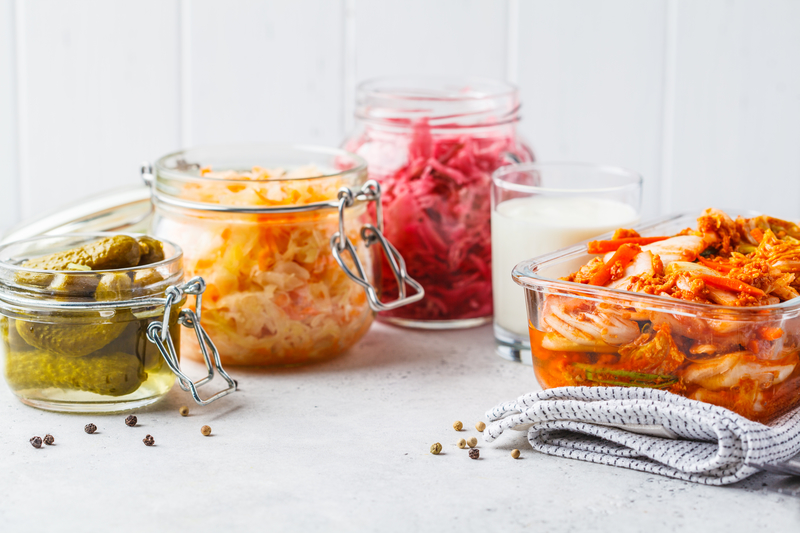Probiotic-Rich Foods or Supplements — What’s Better For You?

–Penny
A: Penny, this is a great question! And you are so right. There are so many options when it comes to probiotics that it can quickly become overwhelming trying to figure out which ones are better. First off, let’s quickly cover what probiotics are and why they’re important.
Probiotics are friendly, living microorganisms that help us stay healthy, and they’re a lot like the microorganisms that reside throughout the digestive tract, beginning in the mouth spanning all the way to the other end (that is, erm… where everything comes out). They’re found throughout the body—not just in the gut. They’re in our mouths, on the skin, and in and around the reproductive organs. Quite simply, these friendly microbes are necessary for us to stay healthy. In fact, the word probiotic literally means “life promoting.” Surprisingly, there are 100 TRILLION or more that live in the digestive tract alone, and each person’s “microflora” (a scientific term used to describe a community of microbes, such as the gut microflora) is unique to them.
A healthy balance of these bacteria benefits mood, reduces stress and anxiety, supports digestive health (reducing constipation and diarrhea), enhances nutrient absorption, and plays a pivotal role in the synthesis of vitamins B and K. A well-balanced gut microflora is also essential for the production of short-chain fatty acids, which can help support brain function, weight management, recovery, the immune system, digestion, energy levels, healthier skin, and they also help prevent the growth of bad bacteria and other pathogens, support overall health, and much more.
Both probiotic-rich foods and supplements have been shown to benefit health and both have been shown to have a positive impact on the balance of the gut microflora. However, when it comes to probiotic supplements, delivery can be a concern. Choosing microencapsulated probiotics and hardy strains of probiotics that are naturally heat- and acid-resistant is important.
Of course, probiotic-rich foods have a much longer history of use—even Hippocrates gave yogurt to his patients to help relieve diarrhea and other disorders. 1 While yogurt was one of the first probiotic-rich foods, probiotics can now be found in or added to everything from teas to chocolates to ice cream along with, of course, the traditional fermented foods, such as vegetables like pickles and cabbage. Probiotic supplements can be found in various forms, including gummies, capsules, liquids, and powders. Yet no studies have compared foods vs. supplements head to head. 1
So, which should you choose?
How ‘bout both?!
Most of us don’t consume nearly enough probiotics—especially considering few people eat robust quantities and varieties of probiotic-rich foods—and that probably includes you, Penny. We don’t get as much probiotics as our ancestors likely did because our diets have changed—drastically. We don’t eat as many fermented foods, and with our lifestyles spent largely indoors and arguably overly sterilized, we lack contact with beneficial bugs found in our surroundings (such as soil, plants, animals, and wildlife). Worse, we’re likely exposed to too many antibiotics, not just with our healthcare but from those found in the foods we eat. These can change the gut microflora for the worse, killing off the good gut bacteria along with the bad. Stress, a poor diet, medical therapies, and highly processed animal proteins (like luncheon meats) can also decrease the number and quality of the microbiome.
That imbalance of gut microbes and overall lack of probiotics may lead to not just digestive issues but skin problems, yeast overgrowth, decreased ability to fight off infections (like a cold or flu), and more.
Even if you’re already taking a probiotic supplement or regularly consuming probiotic-rich foods like yogurt, you may also benefit from a wider range of strains like Bifidobacterium bifidum, Bifidobacterium breve, Bacillus subtilis, Lactobacillus acidophilus, Lactobacillus bulgarius, Lactobacillus plantarum, Lactobbacillus rhamnosus, Lactobacillus reuteri, Streptococcus thermophilus, and Saccharomyces boulardii, to list just a few of the more than 500 species. 2
What we want is diversity, which is why incorporating both probiotic-rich foods and supplements into your diet may be a good idea.
Good probiotic-rich foods include:
- Yogurt (preferably unsweetened and made with organic, grass-fed dairy, coconut milk, etc.)
- Raw Cheese (particularly soft cheeses)
- Traditional Buttermilk
- Kefir (dairy, coconut, or water)
- Pickles
- Brine-Cured Olives
- Sauerkraut
- Kimchi
- Natto
- Tempeh
- Miso
- Kombucha
- Apple Cider Vinegar
- Tea (black and oolong)
- Kvass (a fermented drink made with rye flour or bread with malt that’s low in alcohol)
Buyer beware: Not all versions of these that you find on supermarket shelves actually contain probiotics, so look for the words “naturally fermented” on the label if you purchase any of the foods above. For those in jars, you should also see bubbles in the liquid that indicate live organisms.
Aim to consume 1 to 2 servings per day of probiotic-rich foods—even more if you’re seeking to alleviate issues.
In addition, you can start supplementing with a high-quality, broad-spectrum, multi-strained probiotic with some prebiotics, which help feed the probiotics. And just as important, they need to be alive when you take them, so look for products like BioTrust’s PRO-X10™, which takes advantage of acid-resistant microencapsulation technology to protect the fragile probiotics from stomach and bile acids.
Also look for a product that provides at least 1 billion CFU (colony forming units) per probiotics. More is even better, with 5 to 20 billion being standard dosages. 3






